Sam Woods

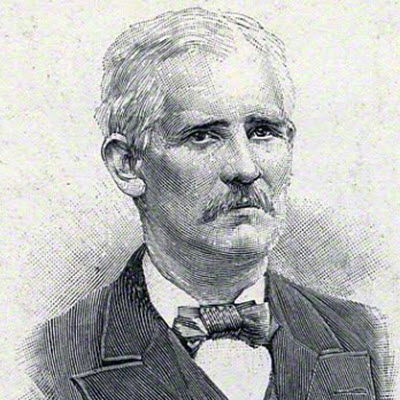
SAM WOODS
Trade Unionist, Baptist lay preacher and Politician
This article and subsequent research came about when the Building Preservation Trust received an e-mail from Harold Goodwin, Chair of the Faversham Society.
Hi, As you will see, this is an object of considerable beauty - hard to imagine, any MP receiving anything remotely similar today.
It has been in my possession for some time but should really return to Wigan. Would this be of value to your Society? I want nothing for it, merely to know that it will be looked after and possibly displayed.
Best regards, Harold https://favershamsociety.org/
The object was an illuminated book presented to Sam Woods M.P for Ince in 1893 by the Wigan Typographical Association.

Who was Sam Woods?
Sam Woods (1846-1915) was born at Peasley Cross, St Helens, but lived for most of his adult life at Bryn. The son of a miner, he first accompanied his father down the pit at the age of 7 and worked at various local collieries over the course of the next two decades. Whilst working alongside his father at Johnson's Colliery, Laffak, he came under the influence of Rev Frederick Greening of the Park Road Baptist Church, attending the evening classes given by Rev Greening for the benefit of local miners and their families, and at the age of 17 he was baptised by Rev Hugh Stowell Brown of the Myrtle Street Baptist Chapel in Liverpool.
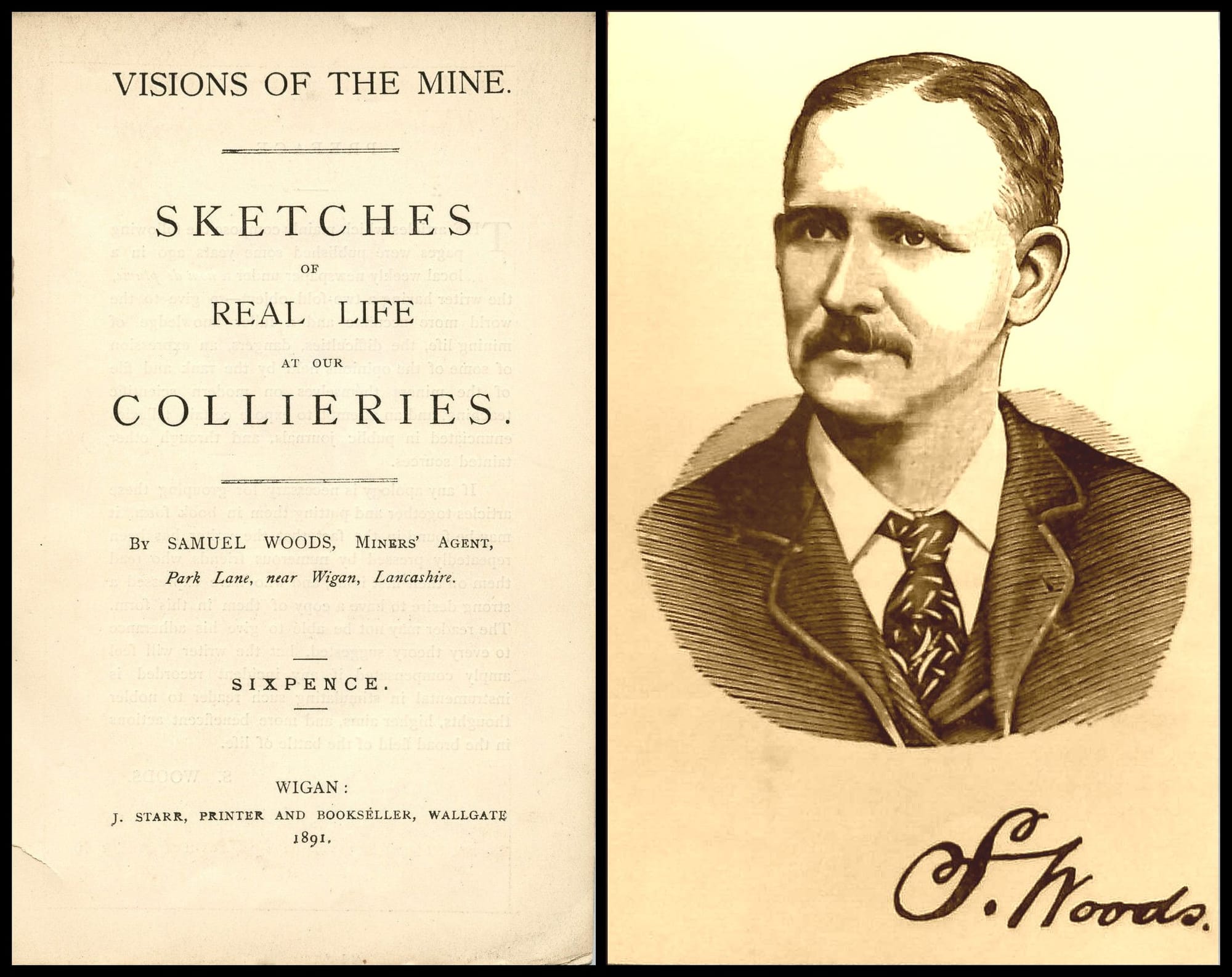 Visions of the Mine - Sketch of Sam
Visions of the Mine - Sketch of Sam
Some of these early experiences are recounted in “Interesting Events in the Life of Tom Jones”, a semi-autobiographical account of Woods' life up to and including his baptism which appeared in an 1891 book “Visions Of The Mine: Sketches of Real Life at our Collieries by Samuel Woods, Miners' Agent, Park Lane, near Wigan, Lancashire”.
In 1867 Woods married miner's daughter Sarah Lee and the couple went on to have four daughters. In 1875 his fellow miners elected him as checkweighman at the Park Lane Colliery. In his spare time he began to organise the miners in the Ashton and Haydock districts and was a key figure in the formation of the Lancashire and Cheshire Miners' Federation, becoming the Federation's first president.
Stung by criticism that he did not appreciate the difficulties faced by those tasked with managing the collieries he studied for and passed the relevant examinations in 1886. When delegates from several coalfields met at Newport in 1889 and formed the Miners' Federation of Great Britain (MFGB), Woods became the new organisation's vice-president. It was also in this period that he became involved in local politics, serving as a member of the Ashton-in-Makerfield Local Board from 1884 until 1887.
Woods was a strong advocate of the main policies of the MFGB; in particular, the demand for a statutory eight-hour working day and a system of mutual defence between coalfields on the wages question. Addressing the organisation's national conference in January 1892 he said: “We hold it as a matter of life and death that any condition of trade ought to render the working man a living. We hold it to be a vital principle that a man by his labour should live, and notwithstanding all the teachings of political economists, all the doctrines taught by way of supply and demand, we say there is a greater doctrine overriding all of those, and that is the doctrine of humanity”. His role in the 1893 lock-out, which strengthened the credibility of the MFGB and led ultimately to government intervention and the establishment of a conciliation board, was commemorated in song-
“All honour to Sam Woods my lads,
He's doing all he can -
Trying to get an honest wage,
For the British working man.
The day is fast approaching,
When the victory we'll shout,
And remember those who helped us
When we were all locked out...”
At the 1892 general election Woods had been returned as MP for the Ince division, promising that: “As a Labour Representative, I should do all in my power to advance the interests of the working classes. As a Liberal and Radical, I should support a Progressive and Democratic policy...”. One of his first Parliamentary interventions, on 11 August 1892, was to call for changes to electoral law and for MPs to be paid a salary in order that candidates from less affluent backgrounds could compete on a level playing field against those able to rely on private wealth or (like himself) union sponsorship.
Aside from electoral reform, the theme to which Woods returned repeatedly during his Parliamentary career was the protection of workers' health and safety. This included plugging the various legal loopholes by which employers were able to avoid liability for accidents at work, such as the concept that workers were themselves collectively responsible for an accident if shown to have been caused by the negligence of any one of them.
In some instances Woods found himself opposed by the very people he was seeking to protect, many workers being unwilling to sacrifice short-term earning potential in exchange for longer-term health benefits. This played into the hands of his Parliamentary opponents, some of whom accused Woods of being out of touch with those he claimed to be representing. A case in point was the campaign for a statutory limit of eight hours on the period that miners could work in a single shift.
This had been a long-standing MFGB objective, and two attempts to get the measure through the Commons had already failed when Woods moved for second reading of yet another Mines (Eight Hours) Bill in 1894. The Bill passed by a majority of 87 but, in committee, its opponents put down a wrecking amendment that would have enabled some parts of the country to opt out if a simple majority of workers voted accordingly. Despite Woods' protest that the most vulnerable -boys in their teens and younger, many working shifts over 10 hours- would not be allowed to take part in the proposed ballots, the amendment passed by a majority of 5 votes and, on 15 August 1894, the Bill was reluctantly withdrawn. (The eight-hour rule was finally brought in by the Coal Mines Regulation Act 1908. Payment of a regular salary to MPs would follow in 1911.)
In November 1893 Woods was presented with an illuminated address by the Typographical Association at its Wigan Branch in recognition of the important service he was able to render to working printers and the trades unionists generally by the stand he took on their behalf in Parliament.
Woods was defeated at the 1895 general election and returned briefly to local politics, being elected to the Ashton-in-Makerfield Urban District Council. By 1897, however, he was back in the House of Commons, this time as MP for Walthamstow. Defeat at the general election of 1900 due to his perceived ambivalence about the rightness of the British cause in the Boer Wars marked the end of his Parliamentary career, though not before he had secured improvements to the local tram system and postal service.
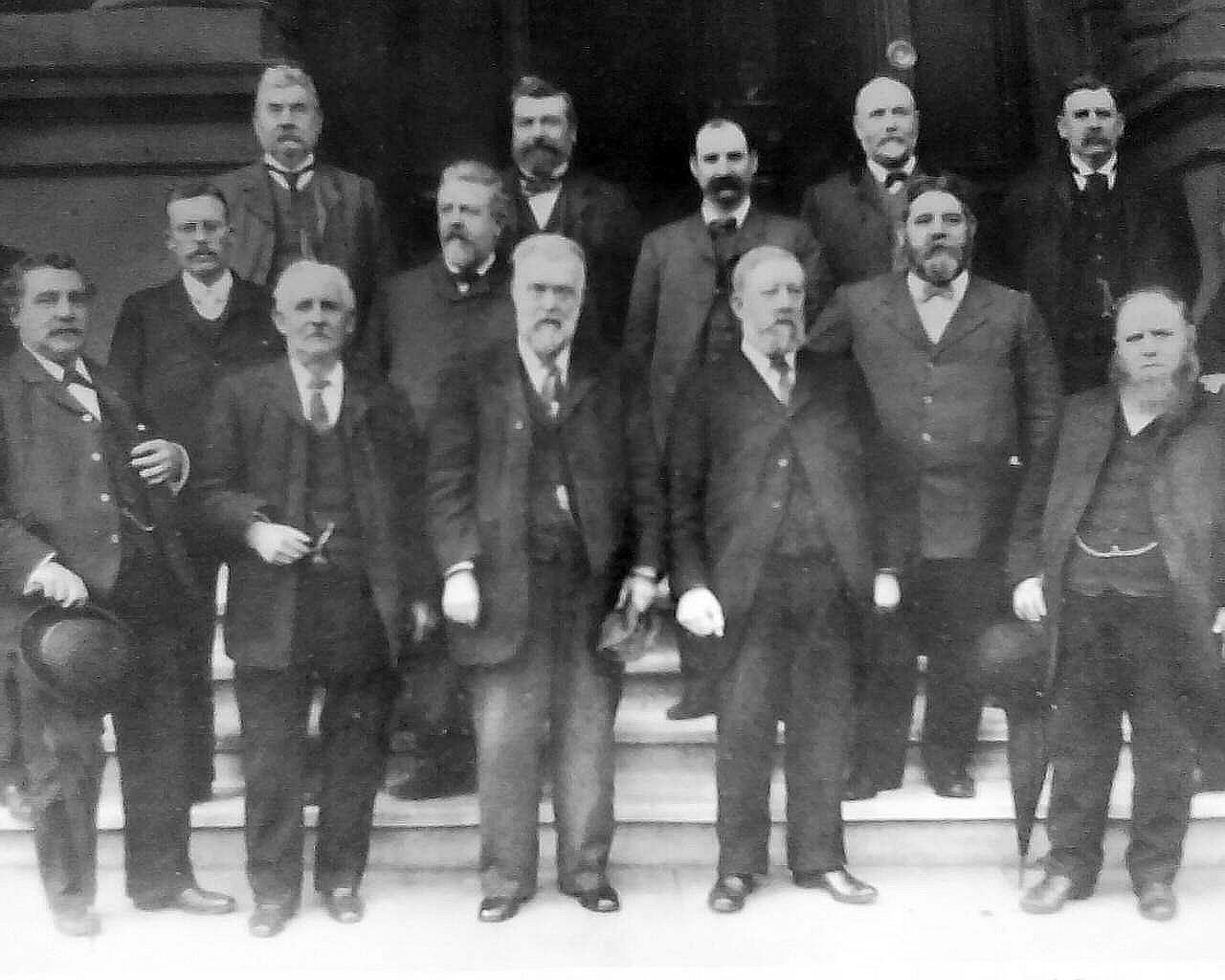 Members of the MFGB executive, mine owners and government ministers outside the Foreign Office in 1893; Sam Woods front row second from left.
Members of the MFGB executive, mine owners and government ministers outside the Foreign Office in 1893; Sam Woods front row second from left.
In 1894 Woods was elected secretary of the Trades Union Congress's Parliamentary Committee, retaining that position until poor health forced him to retire from public life in 1904.
It would be remiss to conclude this brief account of Woods' life without some further mention of the importance to him of his religion and, in particular, of the Baptist Chapel at Bryn. Described as a “temperance advocate from his youth”, he entertained thoughts in the early 1860s of studying for the ministry but was forced to put these aside given the more pressing concern of supporting his family. He nevertheless served for most of his adult life as a lay preacher, Sunday School teacher and Band of Hope leader, combining these activities with the political roles for which he became more famous and with his duties as a husband and father. The chapel at Bryn traces its origins to the year 1868, when Woods and two other members of the Park Road Baptist Chapel at St Helens moved to the area with their families. Sunday services were at first held in the home of Mr and Mrs Woods until “it became apparent that some larger meeting place would have to be found..., the result being that the idea of building a small chapel was hit upon”. An account of the laying of the foundation stones on 27 September 1886 relates how “Shortly after three o'clock the scholars, teachers and members assembled opposite Mr Woods' house at Rose Hill and sang two hymns and the Rev W C Taylor delivered a short address. A procession was then formed about 300 strong consisting of members and friends of the Wigan and St Helens Baptist Churches, and walked to the site of the new building... Mr S Woods [then] presented a silver trowel and an ebony mallet to Mr J S Brown, who at once proceeded to lay the first stone”. Sam Woods served as the church's first president. At his funeral service in the chapel reference was made to “how much he was to his church, and how much his church was to him”: “He loved every brick in it, was interested in every activity connected with it, and up to the very last he made it a point to be here”.
Sam Woods died at his home, Rose Villas, on 23 November 1915. He had played a significant part in the formation of both the Lancashire Miners' Federation and the MFGB, and did a great deal to advance the aims of the latter.
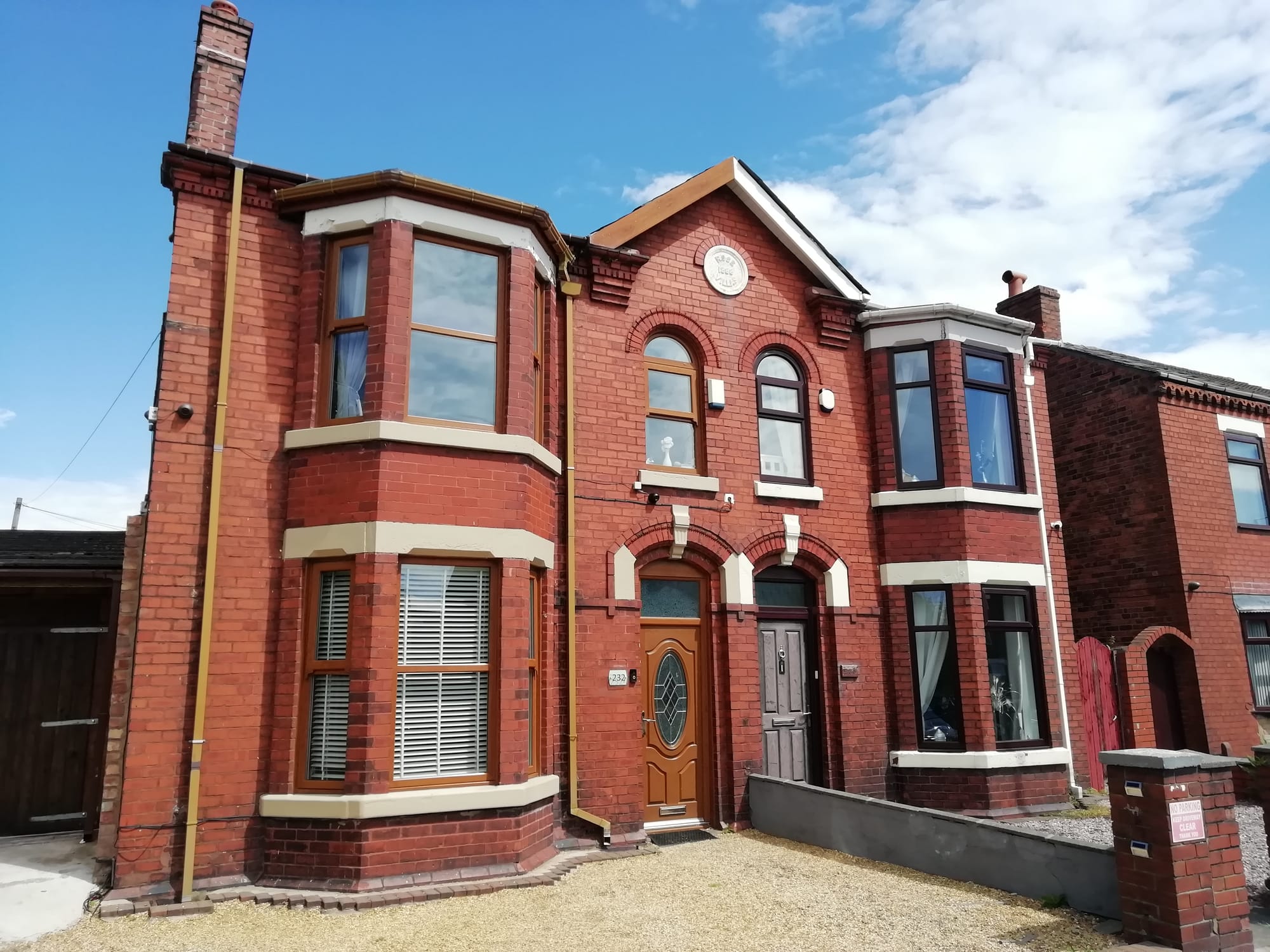 Rose Villas
Rose Villas
His Christian faith and teetotalism meant that he was a reassuring figure both for the mine-owners and for those among his own class who were concerned about ‘Labour agitators’. His secretaryship of the TUC Parliamentary Committee coincided with the formation of the Labour Representation Committee, from which the modern Labour Party traces its origins. His political record has perhaps been overshadowed by the later emergence and dominance of independent labour politics by more radical voices. William Brace, a miners' leader of the next generation and a member of Lloyd-George's Government, remembered him for “his genial companionship and kindly ways”; he was “a dapper gentle kind of soul”.
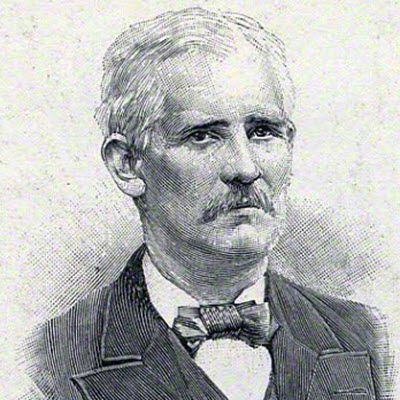 Sam .... a dapper gentle kind of soul ....
Sam .... a dapper gentle kind of soul ....
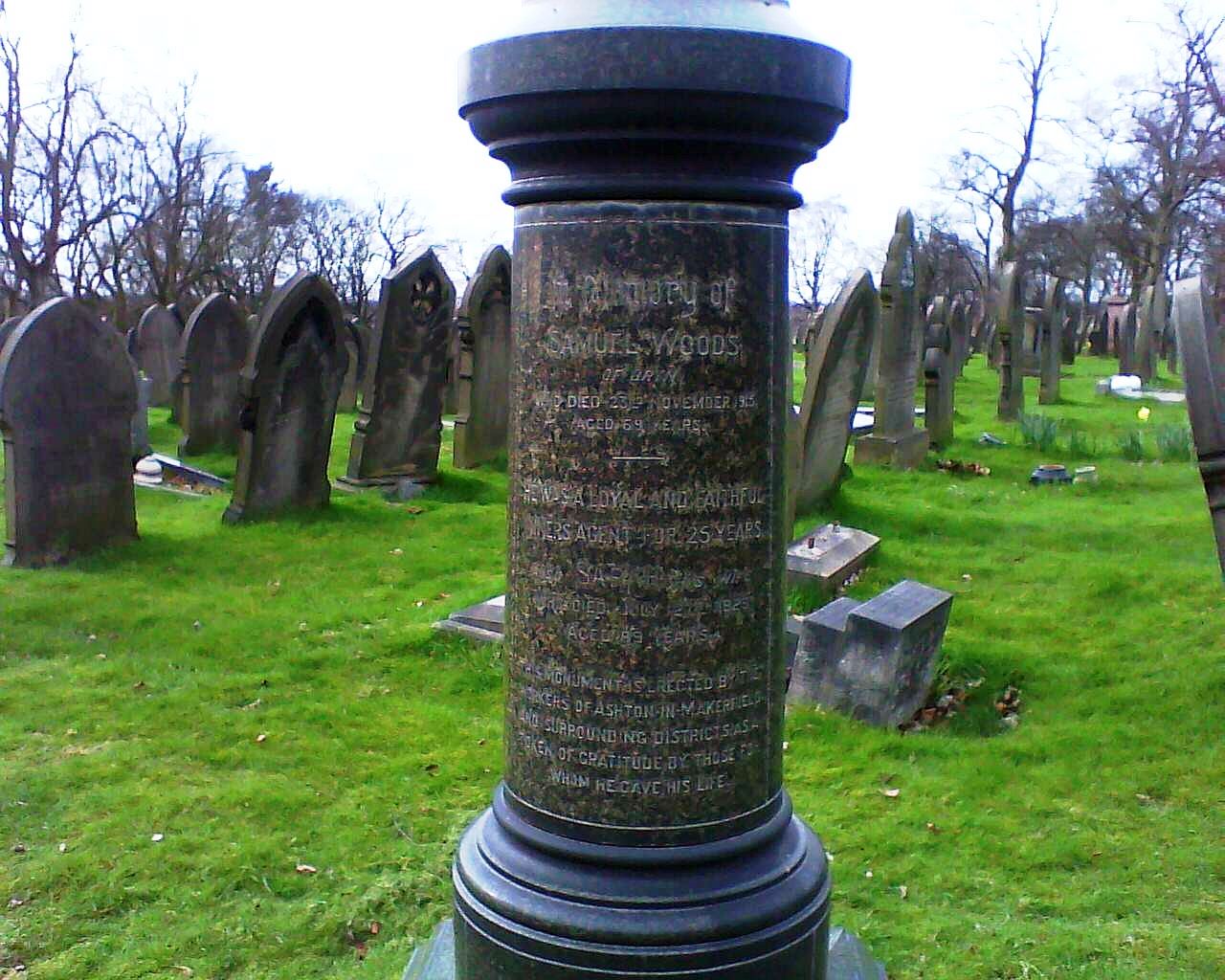 Memorial to Sam
Memorial to Sam
The main inscription reads:
"In Memory of Samuel Woods of Bryn who died 23rd November 1915 aged 69.
He was a loyal and faithful Miners Agent for 25 years.
Also Sarah his wife who died July 27th 1929 aged 89 years
This monument is erected by the Workers of Ashton-in-Makerfield and surrounding districts as a Token of Gratitude by those for whom he gave his life"
On the plinth supporting the central column is written:
“WORTHY OF REMEMBRANCE”.
The Woods' family home, “Rose Villas”, still stands facing Bryn Station. When, in 1917, the Wigan Road entrance to the Baptist Chapel was renovated a brass plate was mounted with the inscription as follows: “This porch is erected and dedicated to the ever loving memory of Sam Woods, one of the founders of this church, by his wife Mrs Woods. April 11th 1917”.
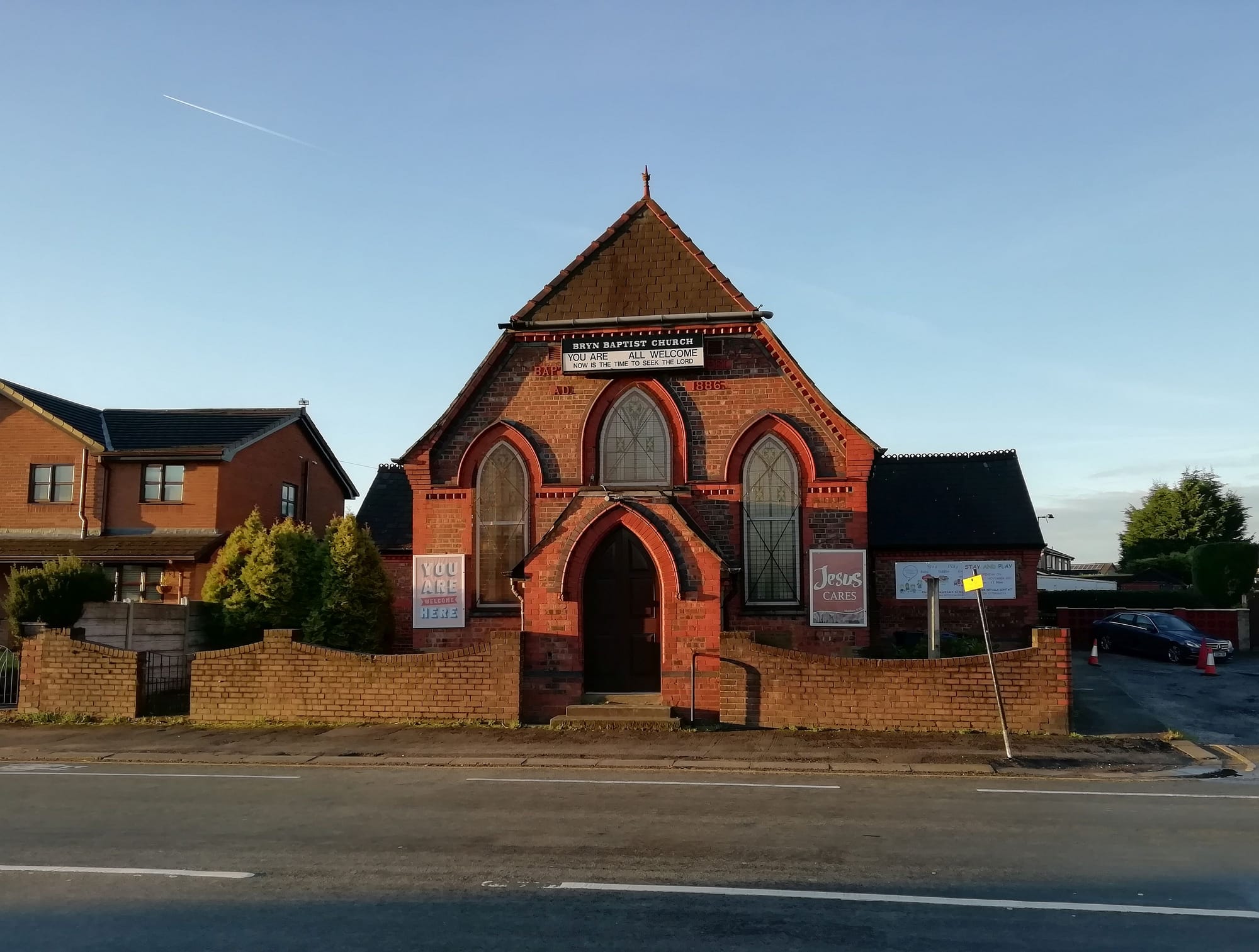 Bryn Baptist Church
Bryn Baptist Church
In 1926 the Sunday School connected with the church, and to which Woods had devoted much of his energy, was similarly dedicated. “Samwoods House”, a sheltered housing development on nearby Whitledge Green, was formally opened on 25 January 1969 by Woods' great-nephew, Councillor Reginald H Jones.
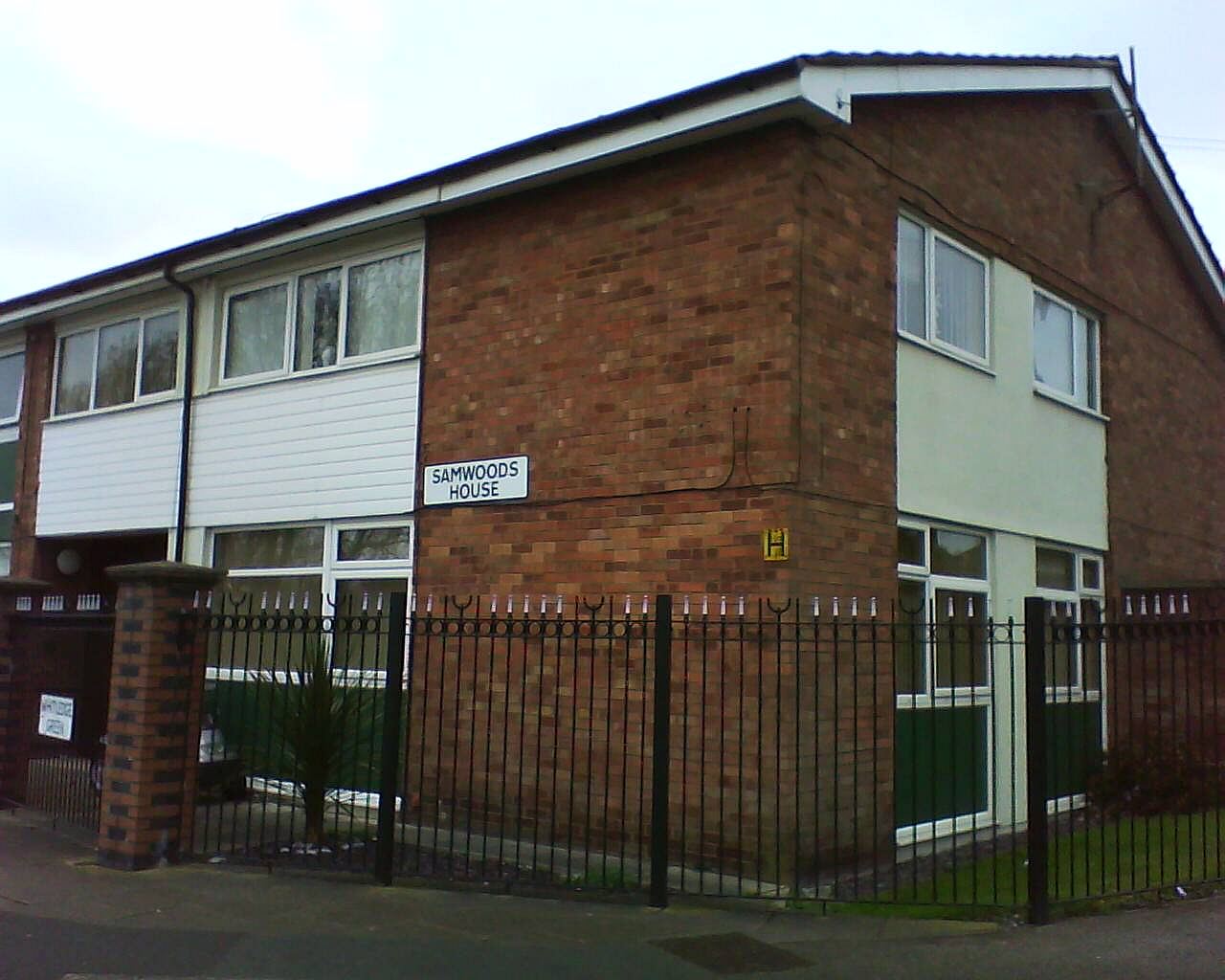 Samwoods House
Samwoods House
Images of the book and the Address:-
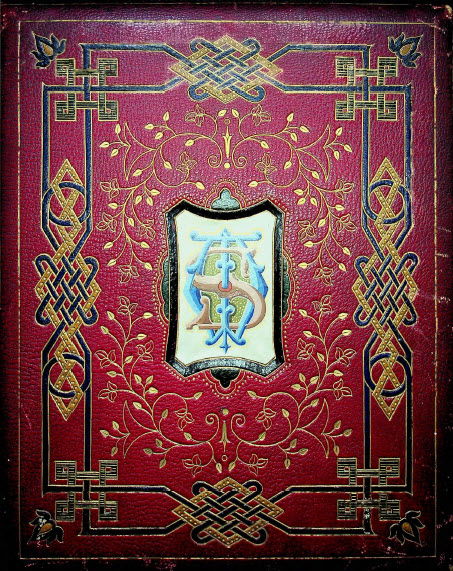
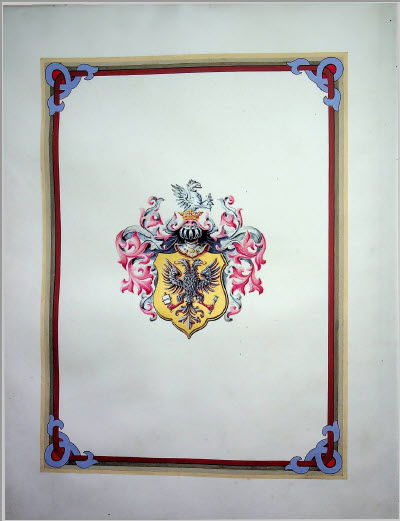
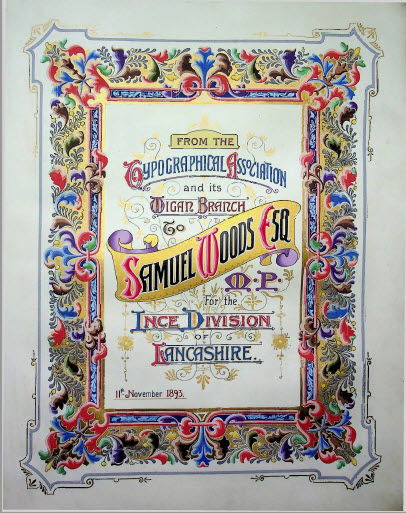
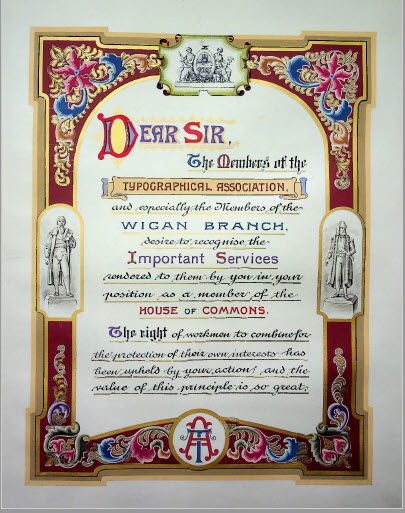
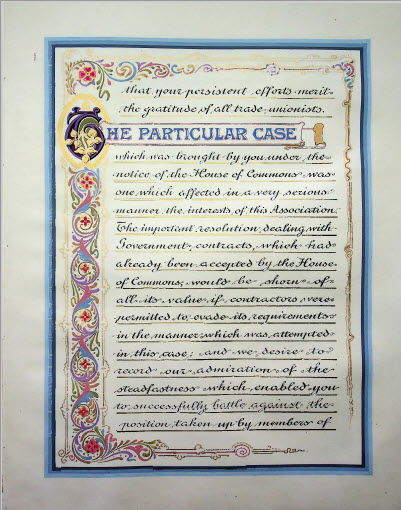
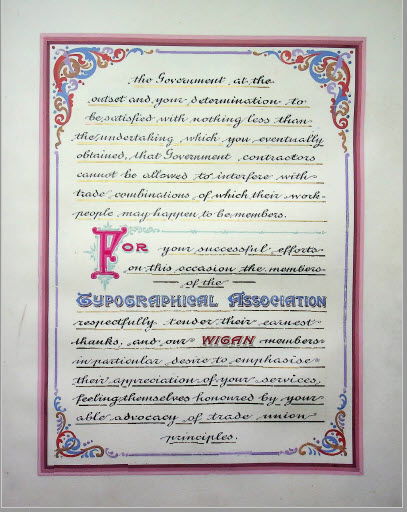
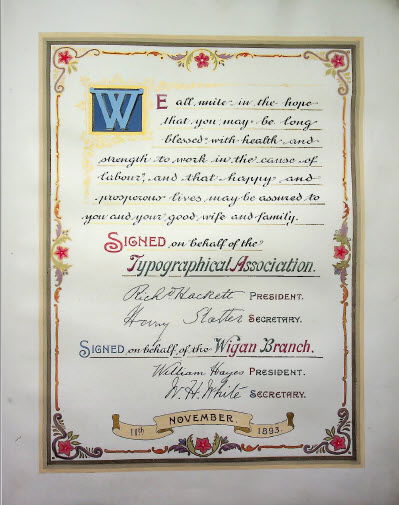
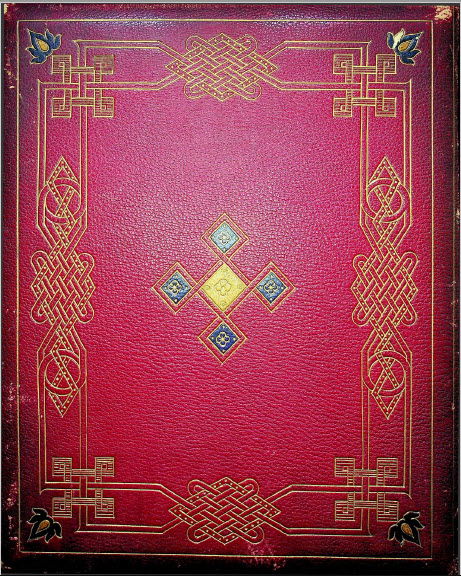 Thanks to Bob Sanders for scanning the above images
Thanks to Bob Sanders for scanning the above images
SEE WHAT HAPPENED NEXT! Click the LINK
Anthony Pilgrim
February 2023
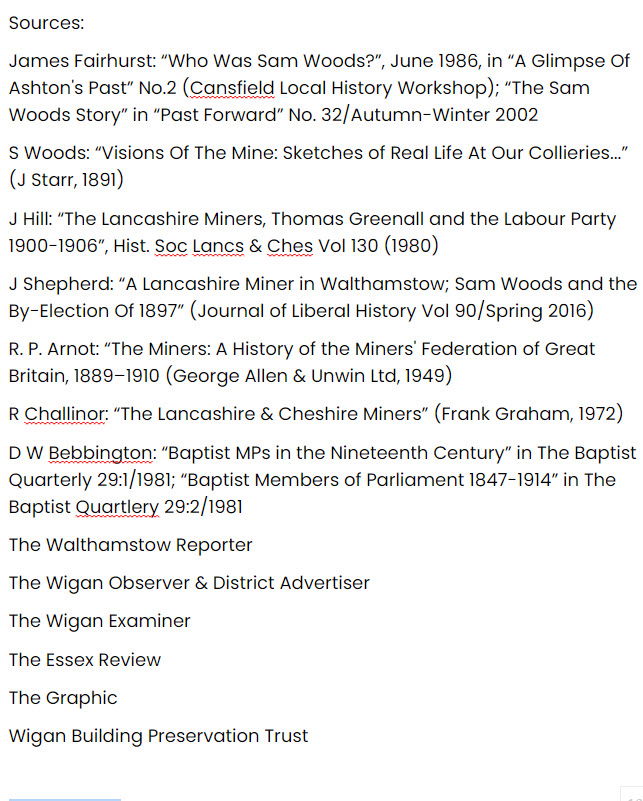
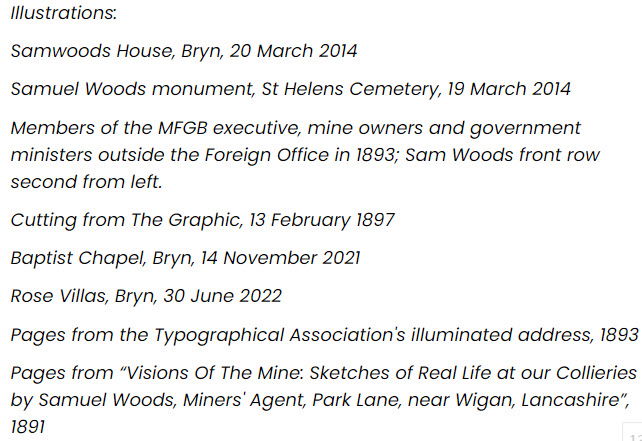
Timeline - Life of Sam Woods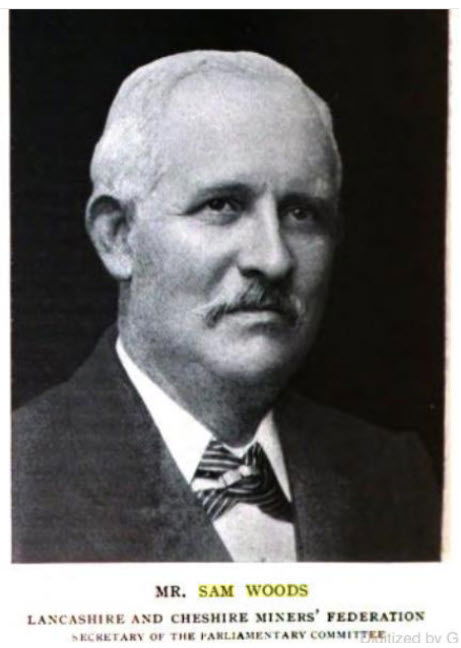 1846 born 10th May in Peasley Cross, St. Helens. Baptised 19 May at St. Mary, St. Helen’s
1846 born 10th May in Peasley Cross, St. Helens. Baptised 19 May at St. Mary, St. Helen’s
1851 Census – Scholar.
1861 Census – Labourer at coal mine (Since 1852)
1867 Sam Woods marries Sarah Lea who hailed from Windle, St. Helens
1871 Census – Coal Miner. First instance that shows Sam, his wife Sarah and daughter Ada living in Ashton-In-Makerfield having come from St. Helens. Parents and siblings also followed and lived in the same area
1875 Elected as pit checkweightman
1881 Census – Weighman at colliery. Joined the Lancashire & Cheshire Miner’s Federation in the same year
1889 The above Federation merged in to the Miners Federation of Great Britain, Sam becoming the organisations first vice-president
1891 Census – Miners Agent
1892 General Election for Ince-In-Makerfield
Sam Woods Lib-Lab 4,579 votes - Henry Blundell Hollinshead Blundell Conservative 4,352 votes
Following the election, a local Conservative was prosecuted for making false statements about Sam in order to influence the result
During his term, he pushed for the Eight Hours Bill, limiting the amount of hours a miner can work in one day
1894 Sam Woods was elected as Secretary of the Parliamentary Committee of the Trades Union Congress
1895 General Election for Ince-In-Makerfield
Henry Blundell Hollinshead Blundell Conservative 5,235 votes
Sam Woods Lib-Lab 4,790 votes
1897 By-Election for Walthamstow (Essex at the time, now London)
Sam Woods Lib-Lab 6,515 votes
Thomas Dewar Conservative 6,289 votes
1900 lost his seat following confusion over his stance on the Second Boer War
1901 Census – Miners Agent
1904 Due to failing health, Sam Woods resigned from his TUC post but retained vice-presidency of the Miners Federation of Great Britain
1911 Census – Miners Representative
1915 dies on 23rd November, aged 69 years.
Andy Lomax and Jim Meehan
Jan 2023
Report from Wigan Observer 16th July 1892.

Newspaper Article
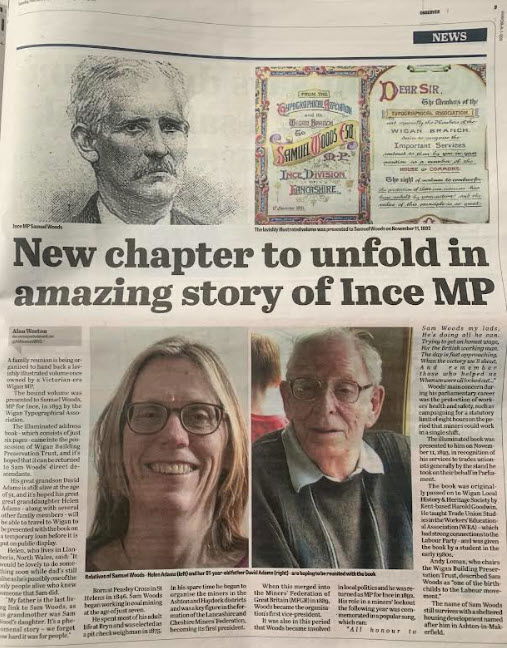
Parliamentary Debate
Josh Simons, MP for Makerfield, mentions Sam in his speech on the Employment Rights Bill debate in the House of Commons.